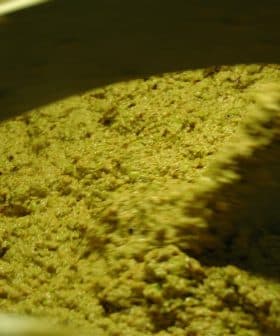Compound Found in Olives Protects Against Symptoms of Neuroinflammatory Disorders, Study Shows
Researchers in Greece and Spain found that oleacein, a compound in olives, may protect against neuroinflammatory disorders like multiple sclerosis. In a study published in Antioxidants, mice treated with oleacein showed delayed development of experimental autoimmune encephalomyelitis, reduced central nervous system damage, and less disruption of the blood-brain barrier compared to untreated mice.
Researchers in Greece and Spain have demonstrated that a powerful antioxidant and anti-inflammatory compound found in olives may provide protective effects against neuroinflammatory disorders, such as multiple sclerosis.
See Also:Health News“We investigated the impact of oleacein on the main clinic-pathological features of experimental autoimmune encephalomyelitis, an animal model for multiple sclerosis, including paralysis, demyelination, central nervous system inflammation and oxidative stress and blood-brain barrier breakdown,” the team of researchers wrote in the study, which was published in the journal Antioxidants.
Agents that cause experimental autoimmune encephalomyelitis were injected into the mice, which were then assessed for symptoms of the disease and graded on a scale of zero to five. Simultaneously, some of the mice were also injected with two doses of oleacein, which had been isolated from Koroneiki extra virgin olive oil.
“The selected oil contained the highest amount of oleacein among the [500] studied samples,“ the researchers wrote.
Oleacein, one of the major secoiridoid phenolic compounds present in extra virgin olive oil, was chosen for the study as a result of previous research that had demonstrated its potential role in the prevention and treatment of neurodegenerative diseases.
“Our group and others have shown positive effects of other olive oil derivatives in an in vivo model of multiple sclerosis, but, to our knowledge, this is the first time in which oleacein is studied in the context of multiple sclerosis,” they wrote.
Over the course of 24 days, the three sets of mice were monitored and two independent researchers assessed their neurological signs. By the end of the study, the researchers distilled five main observations.
Chief among these was that mice treated with oleacein experienced a more delayed development of experimental autoimmune encephalomyelitis and visibly suffered from less severe symptoms.
“While untreated experimental autoimmune encephalomyelitis mice showed partial hind limb paralysis with an average clinical score of 2.5 ± 0.3, in the oleacein-treated experimental autoimmune encephalomyelitis group nine of 11 mice showed inability to curl the distal end of the tail (score 0.5) and only two of 11 mice showed tail atony,” the researchers wrote.
The results also demonstrated that oleacein protected the mice from damage caused by experimental autoimmune encephalomyelitis to the central nervous system.
“Examination of hematoxylin and eosin stained sections of optic nerve, spinal cord and cerebellum showed the presence of cell infiltrates in all tissues from experimental autoimmune encephalomyelitis mice,” the researchers wrote.
“In contrast, the infiltrating cells in the central nervous system tissues from oleacein-treated experimental autoimmune encephalomyelitis mice were notably reduced, being comparable to those observed in tissues of untreated healthy-control mice,” they added.
Along with reduced damage to the central nervous system, the researchers also found that the mice treated with oleacein had reduced disruptions of the blood-brain barrier, which is a relevant pathological hallmark of neurodegenerative diseases.
See Also:Olive Oil May Help Prevent Neurodegenerative DiseasesThe infected mice receiving the oleacein treatment also produced fewer inflammatory markers associated with experimental autoimmune encephalomyelitis in their spinal cord tissue, with some markers being greatly reduced while others were not over-expressed.
The results of the experiment also demonstrated to the researchers that oleacein reduced the oxidative stress experienced in the infected mice.
“The experimental autoimmune encephalomyelitis group showed significantly increased levels of both advanced oxidation protein products and malondialdehyde [both of which cause central nervous system damage in multiple sclerosis] in serum and spinal cord tissue in comparison with the control group,” the researchers wrote. “Meanwhile, oleacein treatment effectively prevented these increases.”
With all of these results in mind researchers said that mice being treated by oleacein experienced a downward trend in terms of the number of cells responsible for inflammation and deforming of nerve tissue in infiltrating the central nervous system.
“In summary, there is a correlation between the inflammatory and oxidative status of the central nervous system and experimental autoimmune encephalomyelitis-induced pathological changes in the central nervous system,” the researchers wrote.
“Based on this study, we suggest that oleacein may provide protective effects in experimental autoimmune encephalomyelitis by reducing leukocyte infiltration into the central nervous system, preventing inflammatory mediators and inhibiting the elevation of the oxidative stress status,” they added.
The results of the study demonstrated that compounds derived from extra virgin olive oil warrant further study when it comes to the search for treatment of neurodegenerative diseases, such as multiple sclerosis.
“Therefore, and with the obvious reservations, due to species change, our data present a promising bioactive molecule, derived from a natural source, extra virgin olive oil, candidate for further research in the treatment of multiple sclerosis and possibly other immune – inflammatory-related diseases,” the researchers concluded.









